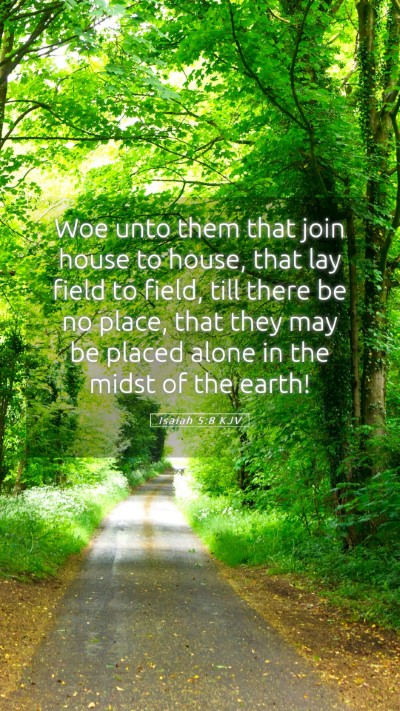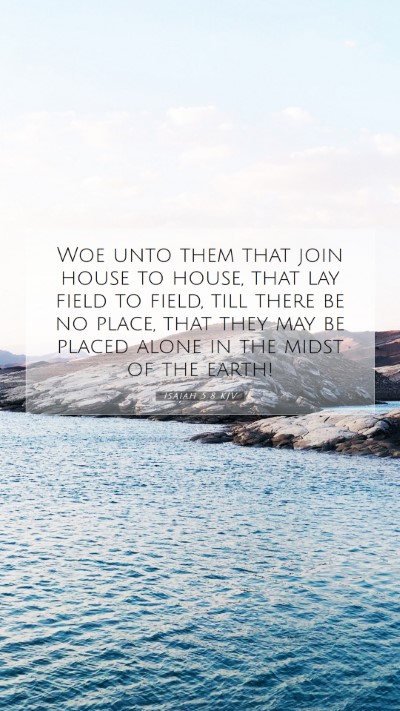Understanding Isaiah 5:8
Isaiah 5:8 states, "Woe to those who add house to house and join field to field, until there is no more room, and you are made to dwell alone in the midst of the land!". This verse serves as a powerful admonition against greed and the insatiable desire for material accumulation, emphasizing the consequences that arise from such behaviors.
This commentary combines insights from renowned biblical scholars and public domain commentaries by Matthew Henry, Albert Barnes, and Adam Clarke.
Contextual Background
The book of Isaiah was written in a time when Israel was facing moral and spiritual decline. The verses within this text highlight specific societal issues, particularly the rampant greed among the people. This greed, depicted through the metaphor of accumulating homes and land, signifies a deeper moral decay and disregard for community and social justice.
Detailed Exegesis and Insights
Matthew Henry's Commentary
Matthew Henry notes that the phrase "woe to those" serves as a stern warning against indulging in excessive worldly possession. He emphasizes that accumulating property for selfish motives ultimately leads to loneliness and isolation. According to Henry, the desire for more often leads to spiritual emptiness as individuals become consumed by their possessions rather than fostering community relationships.
Albert Barnes' Commentary
Albert Barnes highlights the futility and danger of unbridled ambition described in this verse. He remarks that the intent of accumulating wealth can lead to a lack of compassion and concern for others, indicating that such behavior is contrary to God's teachings. Barnes argues that the phrase "until there is no more room" denotes a point at which one's greed affects their social standing, pushing them into isolation.
Adam Clarke's Commentary
Adam Clarke expands on the metaphor by examining the implications of land ownership and wealth in ancient Israel. He posits that the people in power, seeking to amass estates, neglect the needs of the less fortunate. Clarke underscores the profound impact of a materialistic mindset on society as a whole, leading to an imbalance where the rich become richer while the poor suffer.
Theological Implications
The spiritual implications of Isaiah 5:8 serve as a reminder of the transient nature of earthly possessions. This verse calls for readers to reflect on the importance of generosity, community, and responsible stewardship of resources.
Key Themes:
- Greed and Materialism
- Consequences of Isolation
- Social Justice
- Spiritual Emptiness
Related Bible Verses
- Micah 2:2 - "They covet fields and seize them; they defraud people of their homes." - highlighting greed and injustice.
- James 5:1-3 - "Now listen, you rich people, weep and wail because of the misery that is coming on you." - a condemnation of wealth accumulation at the expense of others.
- Luke 12:15 - "Watch out! Be on your guard against all kinds of greed; life does not consist in an abundance of possessions." - caution against greed.
Application to Daily Life
In practical terms, Isaiah 5:8 challenges individuals to evaluate their priorities and urges them to engage in community-building rather than hoarding wealth. Reflecting on this verse can inspire readers to consider how they can live more generously and supportively within their communities, aligning actions with their faith's teachings.
Conclusion
Understanding this verse involves recognizing the wider implications of selfish accumulation and the call to a life of generosity, community, and stewardship. As you study this verse, consider how it interacts with other scriptures and how it can inform your spiritual and practical life.


